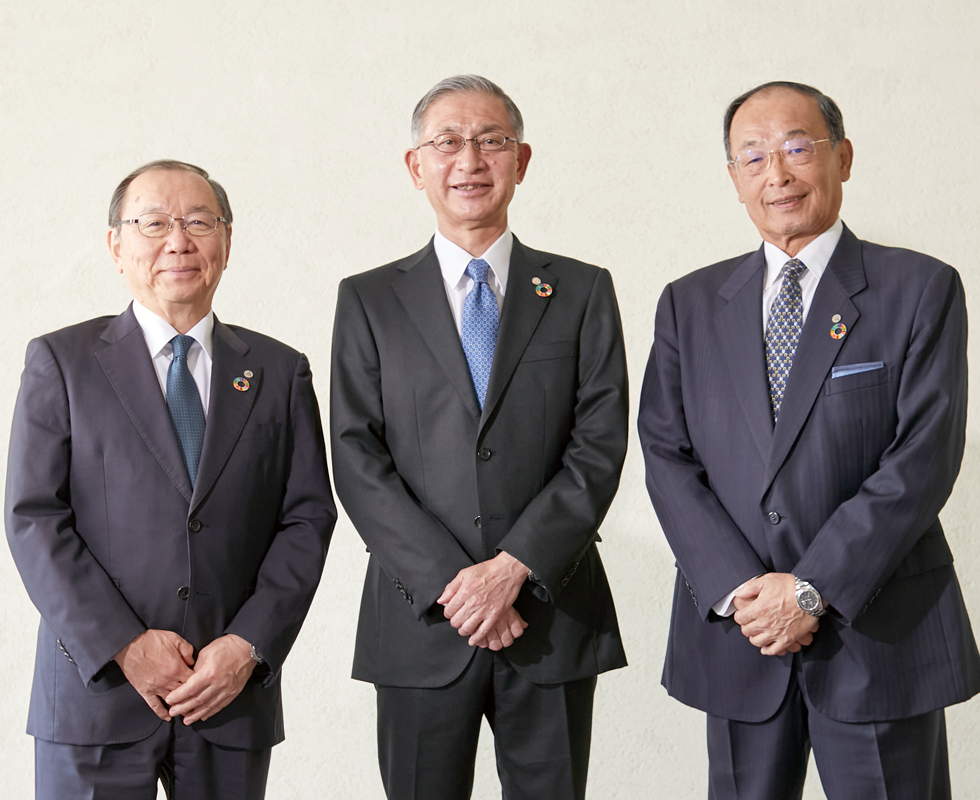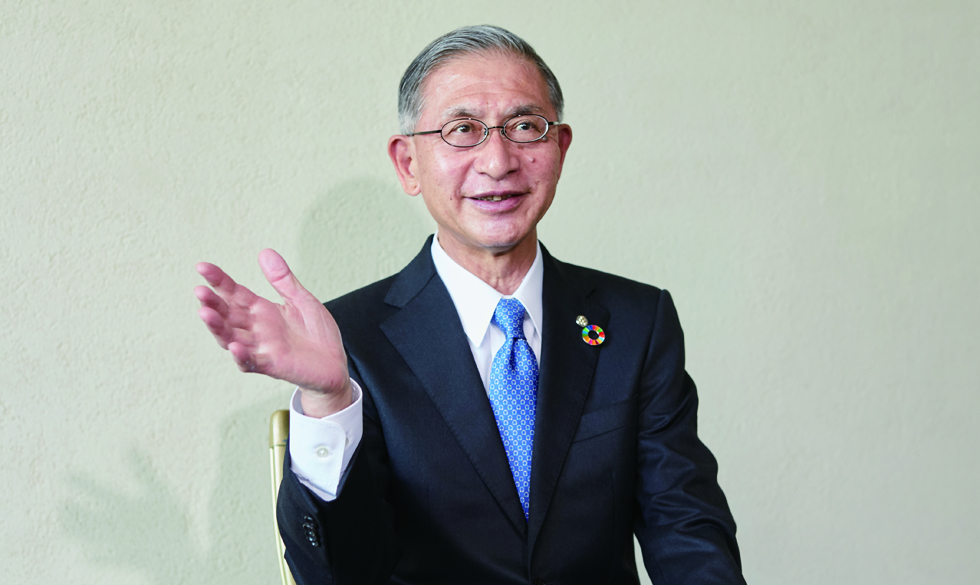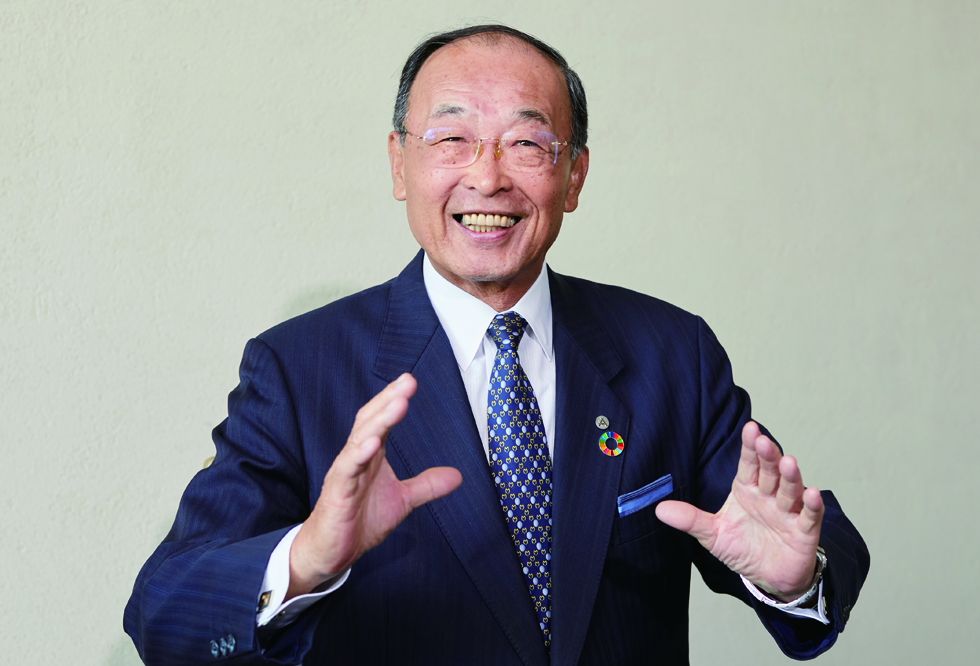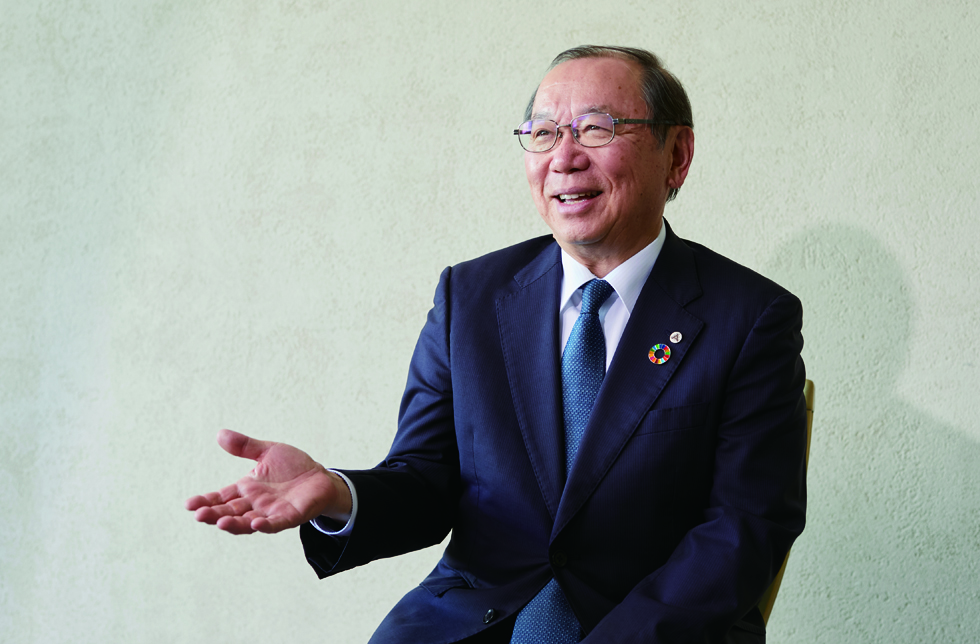
Director and member of the
Audit and Supervisory Committee
Director and standing member of the
Audit and Supervisory Committee
Director and member of the
Audit and Supervisory Committee
Nomura: |
I was appointed a part-time member of the Company’s Audit and Supervisory Committee in 2022, and I have served as a standing Audit and Supervisory Committee member since 2023. As for my previous work experience, after working in banking for 30 years, I was involved in management at a real estate company for eight years and served as the representative of a REIT company under a general trading company after that. I have experience with transactions between banks and business corporations, as well as experience at the New York Branch and in a department in charge of money and FX market transactions. In particular, the many years I spent working with loans have proved helpful in looking over Artner’s finances and accounts. Also, due to my experience serving as the head of a securities agency department, I am proud to say that I can think from a shareholder’s perspective on various matters, such as IR departments, stock-related matters, and general meetings of shareholders. |
Teramura: |
I was appointed a standing member of the Company’s Audit and Supervisory Committee in 2021, and I have served as a part-time Audit and Supervisory Committee member since 2023. During my 29 years working in banking, I was involved in various matters, such as business transactions, overseas branches, and fund management departments. In particular, my experience in finance and accounting, especially in a funds and securities department, helps in discussions concerning Artner’s management strategies, as well as financial strategies. After that, I was seconded to a global logistics company, where I was involved in management for 13.5 years, taking part in transactions in the automobile and machinery industries, as well as in M&A transactions. |
Morii: |
I have served as a member of the Company’s Audit and Supervisory Committee since 2021. In my previous position, I engaged in area management as a branch president for a manufacturer and was involved for a long time in intra-area marketing and sales in general, as well as coordination with the production and development departments and medium-term area strategies. At Artner, I hope to contribute to consultations regarding new business development and sales with respect to our clients. |
Nomura: |
Based on my prior experience and knowledge, outside directors are expected to offer advice from different points of view to help their company grow. I strive for appropriate management by voicing my opinions at board meetings from a neutral, objective standpoint and by leveraging my experience, which differs from that of Inside Directors. |
Teramura: |
Me too. I hope that opinions from different points of view lead to new insights internally and help us to improve our work and establish Management Policies. In addition, since there are internal circumstances that I am not familiar with, I conduct investigations sufficiently in advance and strive for effective communication when conducting interviews with managers at each business office. In particular, I strive to proactively take opportunities to talk with the Internal Audit Office and the Corporate Planning and Strategy Division to gather information. |
Morii: |
Judgments made solely based on the executive side of our work tend to get carried away by company-specific ethics and practices. I also strive to provide objective advice and supervision from an independent perspective that leverages my experience and knowledge. |

Nomura: |
Regarding the two separately held board meetings, I greatly applaud how our business performance is reported in detail at the business report board meeting and how management strategies are also discussed at the regular board meeting, with an eye to increasing enterprise value over the medium to long term. Going forward, I hope that they become places that allow for more proactive exchanges of opinions on the direction we should take with respect to client trends and the state of other companies in the same industry. |
Teramura: |
I feel that regular board meetings allow for expert-level discussions on governance and other topics, and that they are helpful for avoiding aspects that tend to end up being about daily performance management. However, since many agenda items are previous concerns that are still ongoing, discussions are rarely exciting, which I feel is an issue. On this point, it is also key that we Outside Directors raise concerns from a perspective that is different from before. |
Morii: |
I applaud how Compliance and Risk Management Meetings are held regularly to eliminate risks related to maintaining or improving our enterprise value before they become apparent. Also, I feel that the sharing of directions and challenges by the Directors in charge of each department is done well. |
Nomura: |
The Management Division, which is the main division in charge of governance, as well as other departments, has a high level of awareness with respect to governance, and I feel that the business management system at Artner has a strong framework. I applaud the fact that the Internal Control System, which responds to risks that may harm the Company, is also being discussed appropriately. On the other hand, with respect to work efficiency optimization, such as the promotion of IT applications for sales and administrative duties, we must continue improving. |
Teramura: |
I actually feel that governance is being managed well in terms of work sites. Talents having expert-level skills are assigned and placed even in the Internal Audit Office, and its collaboration with the Board of Directors and the Audit and Supervisory Committee is also good. Previously, some departments had shortages in staff to support and manage dispatched engineers at business sites, but we increased the number of staff significantly last fiscal year. |
Morii: |
With committees such as the Audit and Supervisory Committee and the Nomination and Remuneration Committee in place, I believe Artner’s governance and internal control systems are being appropriately managed through the Board of Directors, the Sustainability Committee, the Information Disclosure Committee, and Compliance and Risk Management Meetings. I also greatly applaud how information exchanges and meetings with Audit and Supervisory Committee members, accounting firms, and the Internal Audit Office are held on a regular basis. |
Nomura: |
I believe that fulfilling our role in society and growing stably over the long term by supporting engineers will help to increase our value to society. I think that providing educational opportunities for employees to improve their skills and striving to enhance their technical and human capabilities will also lead to contributions to society. By appropriately operating the Company into the future based on our Management Philosophy and continuing the Company, I believe that we will suf ficiently demonstrate our significance to society, even amid the engineer shortages of the present day. |
Teramura: |
In Japan, simultaneous recruiting of new graduates is the norm for major companies. When I heard from a person who provides employment support for undergraduate students that there are engineering students who give up on engineering because they are unable to get a job at their dream company, I introduced Artner to that person. After brushing up their skills at Artner for several years as dispatched engineers, many employees shift to employment with a manufacturer through our “job change assistance program.” It can be said that our value to society lies in the fact that we provide opportunities for our employees to grow as engineers. Even among manufacturers, there are more and more companies that utilize a certain number of dispatched engineers due to fluctuations in the economy and technological innovations. With regard to these points as well, I feel that we provide sufficient value to society. |
Morii: |
We conclude regular employee contracts with engineers and offer in-house training in stages on an ongoing basis via our own education system. As a result, we are able to compensate for our clients’ engineer shortages and achieve substantial savings for our clients in terms of costs and time related to employment as a group that provides the greatest added value in the industry, and I think that is our value. |

Nomura: |
One critical challenge for the Company is the development of next-generation management talents by proactively promoting young employees. By presenting challenges and granting authority to incredibly capable employees regardless of their age or years of service, I believe that we can tear down the barriers between departments and improve our business performance. It is important that we also change our human resources system and the way we evaluate business performance. I think that increasing the size of the Company will, in turn, allow us to increase the number of administrative talents and make it easier to reform our human resources system. |
Teramura: |
I believe that the development of next-generation management talents is imperative for the Company. As discussed by the Nomination and Remuneration Committee, while we have many expert talents, I feel that there is a shortage of talents who understand the various functions of the Company and can be entrusted with handling management for the future. It is necessary that we make systematic efforts to develop such management talents. |
Morii: |
While the Company’s immediate task was to satisfy the criterion for tradable share market capitalization, which is part of the listing maintenance criteria for the Prime Market, we were able to achieve that. While we still face challenges such as making progress toward diversity and inclusion in talent management and addressing the aging of Directors, they are being considered along with the strengthening of our system for career hires. |

Nomura: |
We were able to satisfy the listing maintenance criteria for the Prime Market. However, we believe the real battle lies ahead. The Company must aim to achieve sustained growth and increase its enterprise value, and fulfill its obligations to society in cooperation with shareholders and other stakeholders. I hope that Artner’s Directors and employees will work together to achieve our shared targets. As an Outside Director, I will also strive to contribute to the development of the Company, even if only a little. |
Teramura: |
For the past two years, satisfying the listing maintenance criteria for the Prime Market was a high-priority issue, but we were able to achieve those criteria last fiscal year with everyone’s cooperation. Going forward, I would like all of Artner’s Directors and employees to continue sharing their wisdom with each other and aim for further growth. |
Morii: |
In an industry with a market size that exceeds one trillion yen, our market share is still low with much room for increases. I believe that all of us at Artner must not forget our efforts last fiscal year to satisfy the listing maintenance criteria for the Prime Market and must continue those efforts with the same sense of urgency so that we do not betray our stakeholders’ expectations. |
August 29, 2024